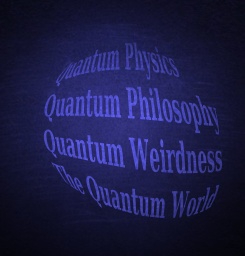Quantum theory is at the base of every natural science from chemistry to cosmology. We need it to understand why the sun shines, how TV sets produce pictures, why grass is green, and how the universe started in the Big Bang. Much of modern technology is based on devices designed with quantum mechanics.
Prequantum physics, classical mechanics, or classical physics, sometimes called Newtonian physics, is usually an excellent approximation for objects much larger than molecules, and it is simpler to use than quantum theory. But it is only an approximation, and it does not work at all for the atoms that everything is made of. Nevertheless, classical physics is basic to our conventional wisdom, our Newtonian world-view. But it's a world-view we now know is fundamentally flawed.
Since ancient times philosophers have come up with esoteric speculations on the nature of physical reality. But earlier generations had the logical option of rejecting such theorizing and holding to a straightforward, commonsense picture. Today, in light of facts demonstrated in quantum experiments, that common-sense view is no longer a logical option.
Can a world-view suggested by quantum mechanics have relevance beyond science? Consider a couple of other questions: Did Copernicus's denial that Earth was the center of the cosmos have relevance beyond science? What about Darwin's theory of evolution? The relevance of quantum mechanics is, in a sense, more immediate than either Copernican or Darwinian ideas, which deal with the long ago or far away. Quantum theory is about the here and now and even encounters the essence of our humanity, our consciousness.
Why then hasn't quantum theory had the intellectual and societal impact of those other insights? Perhaps because those others are easier to comprehend—and much easier to believe. You can roughly summarize the implications of Copernicus or Darwin in a few sentences. To the modern mind at least, those ideas seem reasonable. Try summarizing the implications of quantum theory, and what you get sounds mystical.
Let's try a rough summary anyway. To account for the demonstrated facts, quantum theory tells us that an observation of one object can instantaneously influence the behavior of another greatly distant object—even if no physical force connects the two. Einstein rejected such influences as "spooky interactions," but they have now been demonstrated to exist. Quantum theory also tells us that observing an object to be someplace causes it to be there. For example, according to quantum theory, an object can be in two, or many, places at once—even far distant places. Its existence at the particular place it happens to be found becomes an actuality only upon its (conscious) observation.
This seems to deny the existence of a physically real world independent of our observation of it. You can see why Einstein was troubled. Erwin Schrodinger, a founder of modern quantum theory, told his now famous cat story to illustrate that since the quantum theory applies to the large as well as the small, the theory is saying something absurd. Schrodinger's cat, according to quantum theory, could be simultaneously dead and alive—until your observation causes it to be either dead or alive. Moreover, finding the cat dead would create a history of its developing rigor mortis; finding it alive would create a history of its developing hunger—backward in time.
Anyone who takes the implications of quantum theory seriously would presumably agree that you can't accept it with equanimity. Niels Bohr, the theory's principal interpreter, tells us: 'Anyone not shocked by quantum mechanics has not understood it." But a physicist setting out to design a laser or to explain the behavior of quarks, semiconductors, or stars must concentrate on his or her down-to-earth goal and ignore the theory's "shocking' implications. That is why, in teaching quantum mechanics to physics, chemistry, and engineering students, we avoid dealing with such things as the nature of reality or consciousness.
In fact, even mentioning such issues raises eyebrows. The story is told of a graduate student asking Richard Feynman: "Aside from being a tool for calculation, what actually is the quantum wavefunciion?" The only response overheard was: "Shh! First close the door." As J. M. Jauch puts it: "For many thoughtful physicists, [the deeper meaning of quantum mechanics) has remained a kind of skeleton in the closet.''
Back in the 1950s it was said that any nontenured faculty member in a physics department would endanger his or her career by showing interest in the implications of quantum theory. This is only somewhat less true today, but times are changing. Exploration of the fundamental issues in quantum mechanics increases today and extends beyond physics to psychology, philosophy, and artificial intelligence.
...The quantum enigma has challenged physicists for eight decades. Is it possible that crucial clues lie outside the expertise of physicists? Remarkably, the enigma can be presented essentially full-blown to nonscientists. Might someone unencumbered by years of training in the use of quantum theory have a new insight? After all. it was a child who pointed out that the emperor wore no clothes.
Quantum Enigma, Bruce Rosenblum, Fred Kuttner




No comments:
Post a Comment